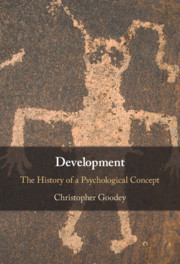Book contents
- Development
- Development
- Copyright page
- Contents
- Acknowledgements
- Introduction
- Chapter 1 Development and the Origin of Psychological Concepts
- Chapter 2 The History of Christianity and the First Principles of Development: Linear Time, Interiority, Structure
- Chapter 3 The History of Education: Rearing the Elect Child
- Chapter 4 Pascal on the Ordering of Human Time
- Chapter 5 The Normalization of the Elect: Locke to Montesquieu
- Chapter 6 The Coining of a Developmental Theory: Leibniz to Bonnet
- Chapter 7 Emile: Rousseau’s Well-Ordered Developer
- Chapter 8 Nature versus Nurture and Cognitive Ability Testing: Historical Sketches
- Postscript Further Targets for Historical Research
- Index
Chapter 2 - The History of Christianity and the First Principles of Development: Linear Time, Interiority, Structure
Published online by Cambridge University Press: 10 June 2021
- Development
- Development
- Copyright page
- Contents
- Acknowledgements
- Introduction
- Chapter 1 Development and the Origin of Psychological Concepts
- Chapter 2 The History of Christianity and the First Principles of Development: Linear Time, Interiority, Structure
- Chapter 3 The History of Education: Rearing the Elect Child
- Chapter 4 Pascal on the Ordering of Human Time
- Chapter 5 The Normalization of the Elect: Locke to Montesquieu
- Chapter 6 The Coining of a Developmental Theory: Leibniz to Bonnet
- Chapter 7 Emile: Rousseau’s Well-Ordered Developer
- Chapter 8 Nature versus Nurture and Cognitive Ability Testing: Historical Sketches
- Postscript Further Targets for Historical Research
- Index
Summary
The first principles behind the developmental idea are linear time, interiority and staged structure. ‘Development’ is one particular historical way of conceptualizing the primary principle of change; in it, human time is an attempt at successful ‘recapitulation’ (a term that would reappear with modern developmental psychology’s founder, G. Stanley Hall) of Adam’s initial failure. In monotheism, time constructs interiority as permanence, ‘the mind’, in contrast with the temporary visitations of pagan or shamanic religion. Medieval psychology saw a proliferation of its ‘faculties’ (memory, imagination, judgement) and ‘operations’ (abstraction, attention, consciousness, logical reasoning, information-processing), which penetrated both the monastic and the humanist idea of the individual. Augustine’s ‘six ages’ of man gave the lifespan a fixed structure. Following the Reformation, change in the elect minority was seen either as instantaneous or as a stadial sequence: Jansenists and Calvinists on the one hand, Jesuits and Arminians on the other, disputed the function of human agency in relation to divine determinism.
Keywords
- Type
- Chapter
- Information
- DevelopmentThe History of a Psychological Concept, pp. 22 - 68Publisher: Cambridge University PressPrint publication year: 2021

